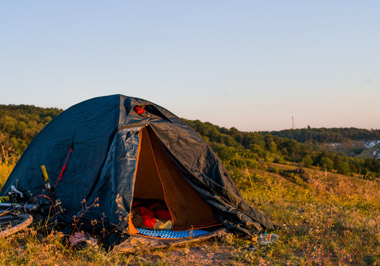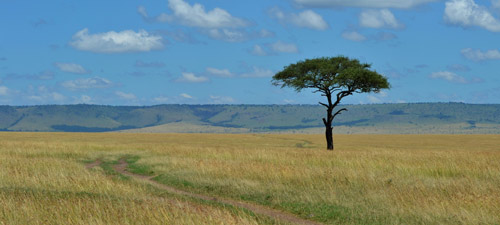Camping sites in Kenya
Go on an adventure and discover the best camps in Kenya. Whether you're a Kenyan camper or an international traveller, explore unique destinations for an unforgettable wilderness experience.

Exploring the vast savannahs of Kenya is an exciting and rewarding experience. This article details the ideal selection of a camping site, obtaining the necessary permits, the appropriate equipment to take with you, preparing for the local climate and the crucial health measures to observe. In addition, tips on safety while camping, local attractions to discover, organising airport-campsite transport as well as travel insurance and holiday packaging will be discussed.
Kenya, renowned for its national parks and breathtaking scenery, is also an ideal place for camping enthusiasts. Whether you're looking for a close-to-wilderness experience or a more tranquil setting, Kenya offers a variety of sites to suit all tastes. Here are some of the best places to camp in Kenya.
The Masai Mara is one of Kenya's most iconic places, famous for its great wildebeest and zebra migrations, as well as its abundant wildlife. Camping in the Masai Mara allows travellers to experience total immersion in the park's ecosystem. Numerous tented camps are set up close to the nature reserves, offering glamping experiences with all the necessary comforts. For those seeking a more rustic experience, several camping areas are available, notably in the Oloololo sector and in the Sekenani region.

Located at the foot of Mount Kilimanjaro, Amboseli National Park is another favourite spot for campers. The park is famous for its vast plains, spectacular scenery and large elephant population. Camping in Amboseli offers a unique experience, with opportunities to observe wildlife while immersed in an exceptional natural setting. Public campsites such as Kimana and luxury lodges offer a range of options to suit all types of camper.
Divided into two sections, Tsavo East and Tsavo West, this reserve is one of Kenya's largest protected areas. Tsavo is renowned for its diversity of landscapes, from dry savannahs to lush forests, as well as its wildlife, including lions, elephants and giraffes. Campers can take advantage of special areas set aside for camping, such as those near the park's main entrance and near rivers, where the sounds of nature add an even wilder dimension to the experience.
Mountain enthusiasts will find plenty to do around Mount Kenya, the second highest peak in Africa. Mount Kenya National Park offers a number of camping options, both at high altitude and in the wooded valleys. Camping on Mount Kenya is ideal for hikers and climbers, who can spend the night in mountain huts before continuing their ascent. The majestic scenery, alpine lakes and local wildlife, such as elephants and buffalo, make this an unforgettable experience.
For those who prefer a quieter, more picturesque campsite, Lake Naivasha in the Rift Valley is a popular destination. An ideal spot for birdwatching, including herons and flamingos, Naivasha offers a number of waterside campsites. Visitors can explore the surrounding area by boat or hike around the lake, while enjoying the tranquil atmosphere.
Once you have chosen the ideal site for camping in Kenya, you will need to obtain the necessary permits. Specific permits are required by certain parks and reserves. You should therefore contact the relevant bodies to find out about the procedures to be followed.
During your stay, preserving the environment is paramount. Leave each site as you found it or better, helping to protect Kenya's natural heritage and ensuring a warm welcome for future visitors.
Preparing your equipment for a camping trip in Kenya requires special attention. An exhaustive list of equipment is needed to ensure a safe and comfortable stay. The tent, of course, is the key element. Choosing a solid structure capable of withstanding the weather conditions specific to the Kenyan region is a wise decision.
Don't overlook the sleeping bag, which needs to be adapted to the night-time temperatures, which can fluctuate considerably depending on the season and the region visited. A compact, lightweight kitchen kit is also a camper's essential: a portable stove, folding utensils and a water bottle are vital.
The first-aid kit deserves a special mention. It should contain essential medicines such as anti-malarials and anti-diarrhoeals, as well as bandages, disinfectant and waterproof dressings.
It's also a good idea to pack a rechargeable solar torch - the perfect way to save energy and still have a reliable source of light after sunset.
With these essentials in hand, every adventurer will be perfectly prepared to fully savour the wonders offered by the unique African destination of Kenya.
Kenya offers a wide range of climates, from hot, humid coastal regions to cool, dry mountain peaks. This variety of weather calls for careful camping equipment. When camping by the sea, for example, light, breathable clothing is essential to cope with the extreme heat.
Another major obstacle is the altitude in mountainous regions such as Mount Kenya. At these high altitudes, the thermometer can plummet drastically during the night. Camping enthusiasts are advised to bring a sleeping bag suitable for low temperatures and thermal clothing.
Although the country enjoys a dry season between June and October, which is ideal for camping, you should always consider the possibility of unforeseen rainfall and carry a waterproof shelter with you. By taking these factors into account, every adventurer will be ready to face the changing conditions of the Kenyan climate during their camping trip.
Kenya, a country rich in splendid scenery and exotic wildlife, requires certain health precautions for a relaxed, uncomplicated camping holiday.
It is essential to be up to date with universal vaccinations such as tetanus, polio and hepatitis B. Although not compulsory, vaccination against yellow fever is strongly recommended.
As far as malaria is concerned, preventive treatment is advisable, particularly if camping near wetlands such as lakes or nature reserves during the rainy season.
To avoid digestive problems and make the most of this unique experience in the heart of Africa, you should opt to drink only sealed bottled water and avoid all raw food.
Have you ever thought about the importance of safety when camping? Camping in Kenya presents unique challenges. Understanding these challenges is crucial to a safe and unforgettable experience.
Respect for local wildlife is essential. Wild animals can be attracted by the smell of food or other items in your camp. Store all food in airtight containers and out of reach of animals to avoid any incidents. Interacting directly with wildlife may seem tempting, but it's best not to do so.
Night-time campfires require special attention: keep an eye on them and extinguish them completely before bedtime to prevent any risk of fire.
Use camping equipment correctly to ensure not only its durability but also your personal safety. Incorrect or careless use can cause unexpected accidents.
Finally, remember that Kenya offers a unique adventure but also imposes its own rules that must be respected to ensure your own safety and that of the beautiful environment around you.
Discovering the local attractions offers an added dimension to the Kenya camping experience. Immerse yourself in Africa's wildlife in the national parks, where Mother Nature's magnificent spectacle unfolds in majestic style.
The sublime, multi-coloured landscapes will stay with you forever. Don't hesitate to expand your knowledge by hiring local guides who will reveal Kenya's captivating history and its well-hidden mysteries.
Having covered the aspects of safety and the local attractions available when camping in Kenya, it is now appropriate to look at the organisation of travel between the air terminal and the campsite.
When you set foot in Kenya, there are several alternatives for getting to your campsite. The first is by taxi or private coach. Several service providers offer this service, providing a safe and comfortable way to reach your outdoor holiday destination. Remember to book this service in advance to avoid any inconvenience on site.
For those with an adventurous spirit, hiring a 4x4 could be an interesting option. Not only does this offer a reliable means of getting to the campsite, it also gives you precious freedom to explore the surrounding area during your stay.
Whatever your choice of mode of travel, it's worth stressing the importance of careful planning. Knowing the distances between the air terminal and the site, as well as the road conditions, will remove any unnecessary pressure associated with travelling.
Good organisation of transport from the airport to the campsite ensures a hassle-free experience where the only thing that counts is the pleasure of travelling and discovering the wonders of Kenya.
Taking out travel insurance is an essential step in preparing for your camping adventure in Kenya. This safety net protects you from unwanted surprises, so that your experience is enjoyable and stress-free.
Travel insurance usually covers emergency medical expenses, repatriation in the event of illness or serious accident, and cancellation of the trip for valid reasons. Some packages even include protection against loss or theft of luggage and valuable equipment such as your camping tools.
It is crucial to examine the details of the contract carefully before taking out cover, to ensure that it meets all your specific requirements. Many companies offer tailor-made options to ensure that adventurous campers like you are well covered throughout your stay in this exotic environment.
Taking the time to choose your insurance will not only guarantee a safe stay, but also total peace of mind throughout your adventure in Kenya.
Find out if your question has been answered in the list below
The best time to camp in Kenya depends on your preferences and the experience you are looking for. The dry season, from June to October, is ideal for safaris and outdoor activities, as the weather is more predictable and animals are more visible around waterholes. The period from November to March is also pleasant, although there is a risk of rain. April and May, during the rainy season, can make some roads impassable, but they offer lush green landscapes and extraordinary tranquillity.
Camping in Kenya can be a safe experience, provided you take a few precautions. Choose reputable, well-secured camps or camping sites, particularly in nature reserves and national parks. It is important to follow the advice of local guides and avoid camping alone in remote or unsupervised areas. In addition, it is essential to observe the safety rules concerning wild animals, such as avoiding leaving food outside your tent and always storing your belongings in secure areas.
Kenya offers a number of outstanding sites for camping. Among the most popular, the Masai Mara and Amboseli National Park offer immersive wildlife experiences. For those seeking a more authentic adventure, Tsavo National Park or Lake Naivasha offer camping close to nature, often with spectacular views. There are also campsites in the Laikipia region, renowned for its savannah landscapes and giraffe populations. Many parks offer well-equipped campsites, or you can choose a more remote campsite for a wilder experience.